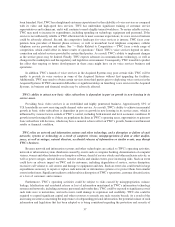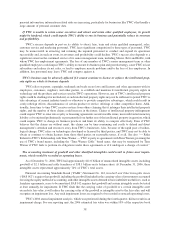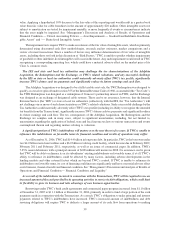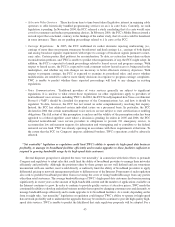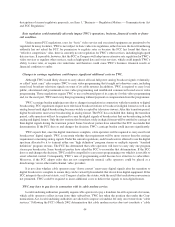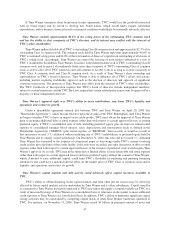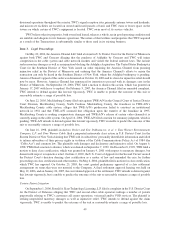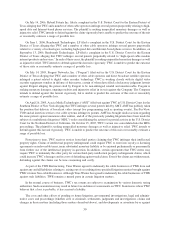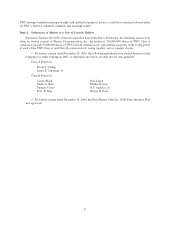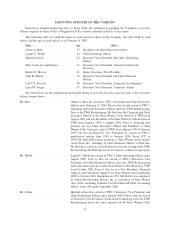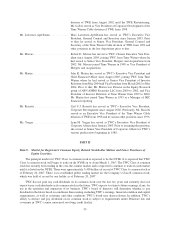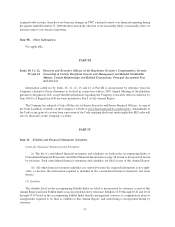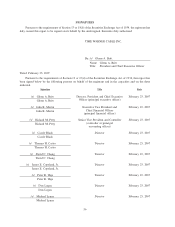Time Warner Cable 2006 Annual Report Download - page 52
Download and view the complete annual report
Please find page 52 of the 2006 Time Warner Cable annual report below. You can navigate through the pages in the report by either clicking on the pages listed below, or by using the keyword search tool below to find specific information within the annual report.If Time Warner terminates these brand name license agreements, TWC would lose the goodwill associated
with its brand names and be forced to develop new brand names, which would likely require substantial
expenditures, and its business, financial results or financial condition would likely be materially adversely affected.
Time Warner controls approximately 90.6% of the voting power of the outstanding TWC common stock
and has the ability to elect a majority of TWC’s directors, and its interest may conflict with the interests of
TWC’s other stockholders.
Time Warner indirectly holds all of TWC’s outstanding Class B common stock and approximately 82.7% of its
outstanding Class A common stock. The common stock held by Time Warner represents approximately 90.6% of
TWC’s combined voting power and 84.0% of the total number of shares of capital stock outstanding of all classes of
TWC’s voting stock. Accordingly, Time Warner can control the outcome of most matters submitted to a vote of
TWC’s stockholders. In addition, Time Warner, because it is the indirect holder of all of TWC’s outstanding Class B
common stock, and because it also indirectly holds more than a majority of TWC’s outstanding Class A common
stock, is able to elect all of TWC’s directors and will continue to be able to do so as long as it owns a majority of
TWC Class A common stock and Class B common stock. As a result of Time Warner’s share ownership and
representation on TWC’s board of directors, Time Warner is able to influence all of TWC’s affairs and actions,
including matters requiring stockholder approval such as the election of directors and approval of significant
corporate transactions. The interests of Time Warner may differ from the interests of TWC’s other stockholders.
The TWC Certificate of Incorporation requires that TWC’s board of directors include independent members,
subject to certain limitations, and the TWC By-Laws require that certain related party transactions be approved by a
majority of these independent directors.
Time Warner’s approval right over TWC’s ability to incur indebtedness may harm TWC’s liquidity and
operations and restrict its growth.
Under a shareholder agreement entered into between TWC and Time Warner on April 20, 2005 (the
“Shareholder Agreement”), which became effective upon the closing of the TWC Redemption, until Time Warner
no longer considers TWC to have an impact on its credit profile, TWC must obtain the approval of Time Warner
prior to incurring additional debt or rental expense (other than with respect to certain approved leases) or issuing
preferred equity, if TWC’s consolidated ratio of debt, including preferred equity, plus six times its annual rental
expense to consolidated earnings before interest, taxes, depreciation and amortization (each as defined in the
Shareholder Agreement) (“EBITDA”) plus rental expense, or “EBITDAR,” then exceeds, or would as a result of
that incurrence exceed, 3:1, calculated without including any of TWC’s indebtedness or preferred equity held by
Time Warner and its wholly owned subsidiaries. On December 31, 2006, this ratio did not exceed 3:1. Although
Time Warner has consented to the issuance of commercial paper or borrowings under TWC’s current revolving
credit facility up to the limit of that credit facility, if the ratio were exceeded, any other incurrence of debt or rental
expense (other than with respect to certain approved leases) or the issuance of preferred stock would require Time
Warner’s approval. As a result, TWC may in the future have a limited ability to incur future debt and rental expense
(other than with respect to certain approved leases) and issue preferred equity without the consent of Time Warner,
which if needed to raise additional capital, could limit TWC’s flexibility in exploring and pursuing financing
alternatives and could have a material adverse effect on the market price of TWC Class A common stock and its
liquidity and operations and restrict its growth.
Time Warner’s capital markets and debt activity could adversely affect capital resources available to
TWC.
TWC’s ability to obtain financing in the capital markets and from other private sources may be adversely
affected by future capital markets activity undertaken by Time Warner and its other subsidiaries. Capital raised by
or committed to Time Warner for matters unrelated to TWC may reduce the supply of capital available for TWC as a
result of increased leverage of Time Warner on a consolidated basis or reluctance in the market to incur additional
credit exposure to Time Warner on a consolidated basis. In addition, TWC’s ability to undertake significant capital
raising activities may be constrained by competing capital needs of other Time Warner businesses unrelated to
TWC. For instance, on November 13, 2006, Time Warner issued $5 billion in principal amount of notes and
47


